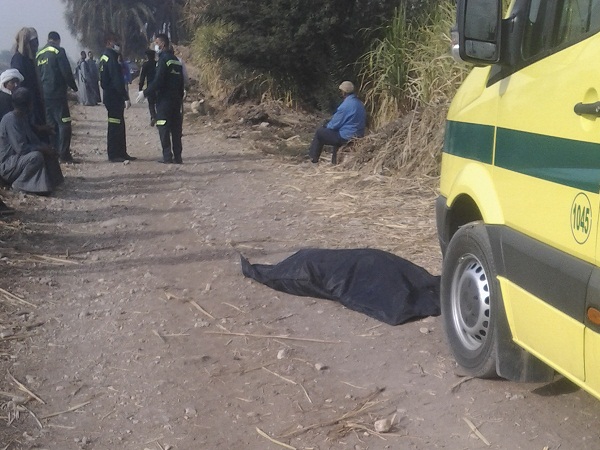
A victim of a ballon accident is seen in a body bag lying on a dirt road near the scene of a crash outside al-Dhabaa village just west of the city of Luxor, 510 kilometers (320 miles) south of Cairo, Egypt, Tuesday, Feb. 26, 2013. A hot air balloon flying over Egypt’s ancient city of Luxor caught fire and crashed into a sugar cane field on Tuesday, killing at least 19 foreign tourists, a security official said. AP/Hagag Salama
CAIRO, Egypt — A hot air balloon caught fire and exploded over Egypt’s ancient temple city of Luxor during a sunrise flight on Tuesday, killing 19 tourists including Japanese and Koreans, sources said.
The balloon which was carrying 21 people was flying at 300 meters (1,000 feet) caught fire when it caught fire, a security official said.
An employee at the company operating the balloon said the pilot and one tourist survived by jumping out of the basket before it plunged to the ground. Both have been taken to hospital.
The employee, who declined to give her name, told Agence France-Presse the tourists were from Korea, Japan and Britain, as well as one Egyptian.
Earlier a security official reported 19 people dead but said they were from Hong Kong, Japan, France and Britain.
“This is terrible, just terrible,” the employee told AFP by telephone. “We don’t yet know what happened exactly or what went wrong,” she said.
The balloon had been floating over the west bank of Luxor, one of Egypt’s most renowned archaeological sites and home to the famous Valley of the Kings and the grand Temple of Hatshepsut.
The British foreign office could not immediately confirm if any Britons had died in the crash.
“We are aware of reports (that Britons might be among the casualties). We are making inquiries,” a foreign office spokesman said.
In 2009, 13 foreign tourists were injured when their hot air balloon hit a phone mast and crashed at Luxor. Sources at the time said the balloon was overcrowded.
The crash comes amid widespread anger over safety standards in Egypt following several deadly transport and construction accidents.